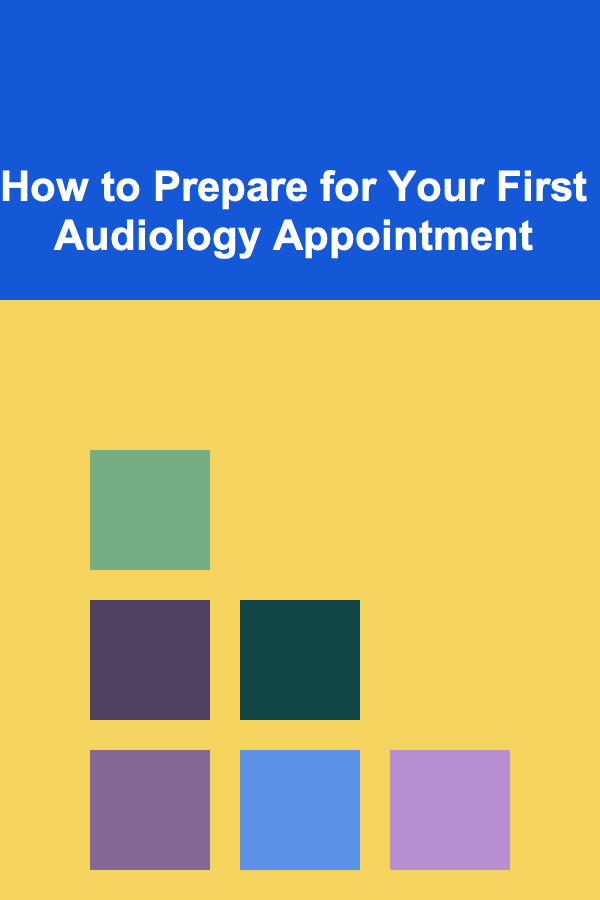
How to Prepare for Your First Audiology Appointment
ebook include PDF & Audio bundle (Micro Guide)
$12.99$9.99
Limited Time Offer! Order within the next:

Hearing health is a vital aspect of overall well-being, yet it's often overlooked until issues arise. Whether you are experiencing symptoms like hearing loss, ringing in your ears (tinnitus), or discomfort in your ears, visiting an audiologist is an essential step toward understanding and addressing your concerns. If it's your first time seeing an audiologist, the process may seem intimidating or overwhelming. However, with the right preparation, you can make the most of your appointment and ensure that you receive the best care possible.
In this guide, we will walk you through the steps to prepare for your first audiology appointment, from understanding the role of an audiologist to what to expect during the visit and how to follow up for continued care. Whether you're struggling with hearing loss or just seeking a hearing check-up, these tips will help you feel confident and informed when you meet your audiologist.
What is an Audiologist?
An audiologist is a healthcare professional who specializes in diagnosing and treating hearing and balance disorders. They are highly trained in audiology, which involves studying the anatomy and physiology of hearing, as well as the management and treatment of hearing-related issues. Audiologists are licensed to perform hearing tests, fit hearing aids, and offer rehabilitation strategies for individuals with hearing impairments.
Some common reasons for seeing an audiologist include:
- Difficulty hearing in noisy environments
- Ringing in the ears (tinnitus)
- Trouble understanding speech, especially in crowded or loud areas
- A sensation of fullness or pressure in the ears
- Repeated ear infections or ear pain
- Balance problems or dizziness
Step 1: Understand Why You Are Visiting
The first step in preparing for your audiology appointment is to have a clear understanding of why you're seeking care. Are you experiencing any specific symptoms? Are you worried about hearing loss? Do you have a family history of hearing problems? Knowing the reasons for your visit will help the audiologist understand your concerns and guide the examination.
Common Symptoms to Consider:
- Difficulty hearing: Struggling to hear people speak, especially in noisy environments, or needing to turn up the volume on the TV or radio.
- Tinnitus: Persistent ringing, buzzing, or whistling sounds in the ears, which can be constant or intermittent.
- Ear fullness or discomfort: A feeling of pressure or fullness in the ears that might affect balance or hearing clarity.
- Balance issues: If you're frequently dizzy, unsteady, or experience a sense of vertigo, it might be related to inner ear or balance function.
- Frequent ear infections or pain: If you have recurring ear infections or discomfort, an audiologist can help assess any underlying issues.
Having a clear understanding of your symptoms will help you communicate effectively with your audiologist.
Step 2: Gather Relevant Medical History
Before your appointment, it's crucial to gather information about your medical history, as it may be related to your hearing concerns. Audiologists will often ask about your overall health, any ear conditions you've had in the past, and any family history of hearing loss or other related disorders.
Things to bring or consider:
- Past medical conditions: Any chronic conditions like diabetes, high blood pressure, or cardiovascular disease.
- Ear health history: Previous ear infections, surgeries, or ear-related issues.
- Medications: Make a list of any medications you're taking, especially if they may affect hearing, such as certain antibiotics or diuretics.
- Family history of hearing loss: If there is a hereditary component to your hearing concerns, be prepared to discuss it.
- Current symptoms: List any hearing, balance, or ear-related symptoms you're experiencing. Mention when the symptoms started, whether they are getting worse, and whether they are constant or intermittent.
Step 3: Know What to Expect During the Appointment
Knowing what to expect during your first audiology appointment can help you feel more comfortable and reduce any anxiety you may have. Here's an overview of the typical process:
-
Initial Consultation: The audiologist will begin by asking questions about your medical history, symptoms, and lifestyle. They may inquire about your work environment, hobbies, or whether you've been exposed to loud noises in the past.
-
Hearing Evaluation: The core part of the audiology appointment is the hearing evaluation, which includes several tests to assess your hearing ability. Some common tests include:
- Pure-tone audiometry: This test involves listening to a series of tones at different frequencies and volumes to determine the softest sounds you can hear.
- Speech audiometry: The audiologist will play recorded speech at different volumes to test your ability to understand speech.
- Tympanometry: This test measures the movement of your eardrum in response to air pressure, which can help diagnose issues like ear infections or fluid buildup.
-
Balance Testing: If you've reported balance problems, the audiologist may conduct additional tests to assess your vestibular (balance) system. This can include the caloric test or tests to check for dizziness and vertigo.
-
Review of Results: After the tests, the audiologist will review the results with you. If hearing loss is detected, they will explain the type and degree of loss, whether it's sensorineural or conductive, and what that means for your overall health.
-
Next Steps: Based on the results, the audiologist will discuss possible treatment options, which may include:
- Hearing aids or assistive listening devices
- Tinnitus management strategies
- Lifestyle changes or environmental modifications to reduce hearing strain
- Further testing or referral to a specialist if needed
Step 4: Be Prepared to Ask Questions
Your first audiology appointment is a great opportunity to learn more about your hearing health and how to manage any concerns you may have. Don't hesitate to ask questions about your test results, treatment options, and anything else that is unclear. Some common questions to consider include:
- What is the cause of my hearing loss?
- Can my hearing loss be reversed, or is it permanent?
- Do I need hearing aids, and how do they work?
- What are the best options for managing tinnitus?
- Are there any lifestyle changes I can make to protect my hearing?
- How often should I come for hearing check-ups?
Make sure you understand the next steps in your care and what to do if your symptoms worsen or if you have any further questions down the road.
Step 5: Bring a Companion, If Necessary
If you feel nervous or overwhelmed, or if you think you may not fully understand the information provided, it's helpful to bring a family member or friend with you to your appointment. Having a trusted person there can help with taking notes, asking questions, and providing emotional support.
Additionally, having someone else present can help ensure you don't miss any important information, especially if you're given a lot of technical details or recommendations for follow-up care.
Step 6: Consider Your Lifestyle and Hearing Needs
When you visit an audiologist, they will tailor their recommendations to fit your lifestyle and hearing needs. For example, if you work in a noisy environment, you may need special hearing protection. If you live alone, you might benefit from hearing aids that alert you to sounds like the doorbell or telephone.
Things to think about:
- Work environment: Are you regularly exposed to loud sounds or machinery?
- Hobbies: Do you listen to music, attend concerts, or participate in other loud activities?
- Social life: Do you often have trouble hearing in social situations, such as at restaurants or during group conversations?
Providing the audiologist with this information will help them offer more personalized advice and solutions.
Step 7: Post-Appointment Care and Follow-Up
Once your first appointment is over, it's important to follow any recommendations or instructions provided by your audiologist. If hearing aids are prescribed, you'll likely have a follow-up appointment to ensure they are functioning properly and that they're a good fit for you. If you were referred to another specialist, such as an otolaryngologist (ENT), be sure to schedule those visits promptly.
You may also be advised to come back for routine check-ups, particularly if hearing loss or other symptoms worsen over time.
Conclusion
Your first audiology appointment is an essential step toward better hearing health. With the right preparation, you can ensure that you fully understand the cause of your symptoms and take the necessary steps to manage or treat any hearing-related issues. By gathering your medical history, knowing what to expect, and asking questions, you can make the most of your visit and feel more confident about your care moving forward.
Remember, hearing health is a journey, and seeking professional help early on can make a significant difference in maintaining and improving your quality of life.
Reading More From Our Other Websites
- [Personal Care Tips 101] How to Incorporate Hair Oil into Your Daily Haircare Routine
- [Home Family Activity 101] How to Create a Time Capsule with Your Family for Future Generations
- [Organization Tip 101] Why Organizing Your Space Can Lead to Better Focus
- [Toy Making Tip 101] Best Techniques for Adding Real‑istic Texture to Hand‑Painted Toy Figures Using Household Items
- [Home Space Saving 101] How to Implement a Minimalist Lifestyle for More Space
- [Home Pet Care 101] How to Choose the Best Dog Grooming Tools for a Flawless Groom
- [Home Cleaning 101] How to Choose The Best Mop for Tile Floors: A Comprehensive Buyer's Guide
- [Personal Investment 101] How to Understand and Use Technical Analysis for Stock Picking
- [Weaving Tip 101] Best Eco‑Friendly Fibers for Sustainable Hand‑Weaving Projects in 2025
- [Personal Investment 101] How to Earn Passive Income by Teaching Deep Learning Online

How to Make Your Bathroom Look and Feel Luxurious
Read More
How to Organize Lunchbox Essentials for Easy Packing
Read More
How to Reassess Your Financial Situation After a Setback
Read More
How to Start Seeds Indoors: A Comprehensive Guide
Read More
How to Understand the Tokenization of Assets
Read More
10 Tips for Using Technology to Streamline Your Customs Brokerage Process
Read MoreOther Products

How to Make Your Bathroom Look and Feel Luxurious
Read More
How to Organize Lunchbox Essentials for Easy Packing
Read More
How to Reassess Your Financial Situation After a Setback
Read More
How to Start Seeds Indoors: A Comprehensive Guide
Read More
How to Understand the Tokenization of Assets
Read More